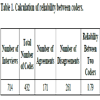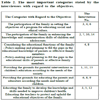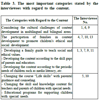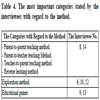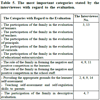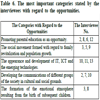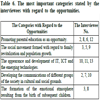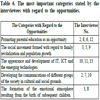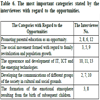- Home
- About Journals
-
Information for Authors/ReviewersEditorial Policies
Publication Fee
Publication Cycle - Process Flowchart
Online Manuscript Submission and Tracking System
Publishing Ethics and Rectitude
Authorship
Author Benefits
Reviewer Guidelines
Guest Editor Guidelines
Peer Review Workflow
Quick Track Option
Copyediting Services
Bentham Open Membership
Bentham Open Advisory Board
Archiving Policies
Fabricating and Stating False Information
Post Publication Discussions and Corrections
Editorial Management
Advertise With Us
Funding Agencies
Rate List
Kudos
General FAQs
Special Fee Waivers and Discounts
- Contact
- Help
- About Us
- Search

The Open Family Studies Journal
(Discontinued)
ISSN: 1874-9224 ― Volume 12, 2020
Areas for Reforming and Complementing the Family and School Interaction
Jamileh Alamolhoda1, *
Abstract
Background:
The Family and School Interaction (FSI) is undoubtedly very effective in promoting the education of children in a society, but this interaction requires the adoption of educational goals as well as frameworks that can produce the best educational outcomes. The educational goals and frameworks, on the one hand, depend on the theoretical foundations and our view of the educational role and position of the family and its relation to that of the school, and on the other hand the environmental conditions and opportunities or challenges for the FSI.
Aim:
The overall purpose of the present study is to explore the areas and ways of reforming and complementing the FSI.
Methods:
The study is a qualitative research relying on analyzing the views of Iranian family and education experts. The areas under consideration for reforming and complementing the FSI are the school curricula, and the study examines the role of the family in the most important elements of a curriculum, namely objectives, content, method and evaluation.
Results:
The results show that most scholars, professionals, principals, and teachers consider the educational role of the family and its contribution to school education, but their beliefs about this role and its status in relation to that of the school are still unclear. They have often become accustomed to giving the less importance to the family and the most important to the school, and the curricula are often formulated without considering the views and expectations of the family and without parental involvement.
Conclusion:
The consideration of the real role of the family and its lasting effects have important implications, including reforming the family education programs, reforming the academic education and in-service teacher trainings, modifying the FSI models, rationalizing the family interventions in school affairs, as well as enhancing the students’ self-esteem and their sense of belonging to school.
Article Information
Identifiers and Pagination:
Year: 2020Volume: 12
First Page: 1
Last Page: 9
Publisher Id: TOFAMSJ-12-1
DOI: 10.2174/1874922402012010001
Article History:
Received Date: 08/10/2019Revision Received Date: 10/01/2020
Acceptance Date: 20/01/2020
Electronic publication date: 13/03/2020
Collection year: 2020
open-access license: This is an open access article distributed under the terms of the Creative Commons Attribution 4.0 International Public License (CC-BY 4.0), a copy of which is available at: https://creativecommons.org/licenses/by/4.0/legalcode. This license permits unrestricted use, distribution, and reproduction in any medium, provided the original author and source are credited.
* Address correspondence to this author at the Department of Education, University of Shahid Beheshti, Tehran, Iran; Tel: +00982122431717;
E-mail: Alamolhodaj@gmail.com
| Open Peer Review Details | |||
|---|---|---|---|
| Manuscript submitted on 08-10-2019 |
Original Manuscript | Areas for Reforming and Complementing the Family and School Interaction | |
1. INTRODUCTION AND STATEMENT OF THE PROBLEM
Almost all religions, philosophical schools and great thinkers have so far emphasized the role of the family in education. In addition, most professionals, planners, principals and teachers clearly pay attention to this role [1Sensiper S. Generating family-school partnerships through social marketing. Soc Mar Q 2010; 5(1): 16-21.
[http://dx.doi.org/10.1080/15245004.1999.9961033] , 2Farrell AF, Collier MA. School personnel perceptions of family-school communication: A qualitative study. Improving Schools 2010; 13(1): 4-20.
[http://dx.doi.org/10.1177/1365480209352547] ]. Some researchers have managed to reveal objectively the benefits of parental involvement in some educational activities, such as education of children [3Wilkins J, Terlitsky AB. Strategies for developing literacy-focused family–school partnerships. Intervention Sch Clin 2016; 51(4): 203-11.
[http://dx.doi.org/10.1177/1053451215589181] ], disabled children [4Friedman R. Using the family school in the treatment of learning disabilities. J Learn Disabil 1978; 11(6): 378-82.
[http://dx.doi.org/10.1177/002221947801100610] [PMID: 670828] ], and children with asthma and special needs.
In addition, so much research has confirmed the significant effects of the family and school participation on social-behavioral skills and mental health of children [5Sheriden SM, Smith TE, Kim EM. A meta-analysis of family- school interventions and children social- emotional functioning: Moderators and components of efficacy. Rev Educ Res 2019; 89(2): 296-332.
[http://dx.doi.org/10.3102/0034654318825437] ]. Of course, some principals and teachers emphasize the problems associated with the family involvement in school affairs and believe that the diversity of perspectives and methods as well as the low level of parental education always make it difficult to make important educational decisions at school. However, the positive view to the Family and School Interaction (FSI) is an evolving approach; not only the education professionals but also most policy makers and planners and even many principals and teachers agree that the FSI brings about fruitful educational outcomes.
Yet, some research studies indicate there are still some negative views on the role of parents at school [6Pelco LE, Ries RR. Teachers attitudes and behaviors towards family-school partnerships. Sch Psychol Int 1999; 20(3): 265-77.
[http://dx.doi.org/10.1177/0143034399203002] ]. This type of negative attitude comes from the problems caused by the parental involvement in school affairs [7Laereau A, Munoz VL. You are not going to call the shots: Structural conflicts between the principal and the PTO at a suburban public elementary school. Sociol Educ 2012; 85: 201-18.
[http://dx.doi.org/10.1177/0038040711435855] ]. These problems result from the disagreement between parents who prefer informal relationships and friendly behaviors and teachers and principals who emphasize formal relationships and a disciplined, safe and bureaucratic school environment. They are sometimes the result of the disagreement between parents and teachers over authority in planning the curricula or cultural and extracurricular events. Of course, such a research study also considers the need to attract the teachers’ attention to the positive role of the family in education [7Laereau A, Munoz VL. You are not going to call the shots: Structural conflicts between the principal and the PTO at a suburban public elementary school. Sociol Educ 2012; 85: 201-18.
[http://dx.doi.org/10.1177/0038040711435855] ].
In sum, most experts and professionals have found the educational involvement of the family in school education an indispensable issue, and the only question surrounds the quality and extent of this involvement. In other words, different studies show there are two basic needs. First, there should be strategies for encouraging families to participate in school education and to increase the extent of their participation [3Wilkins J, Terlitsky AB. Strategies for developing literacy-focused family–school partnerships. Intervention Sch Clin 2016; 51(4): 203-11.
[http://dx.doi.org/10.1177/1053451215589181] ]. Second, there is a need to reform the family intervention models [7Laereau A, Munoz VL. You are not going to call the shots: Structural conflicts between the principal and the PTO at a suburban public elementary school. Sociol Educ 2012; 85: 201-18.
[http://dx.doi.org/10.1177/0038040711435855] ]. Of course, we still need more research to reform and complement the FSI. For example, comprehensive research should be performed to examine the effects of the FSI on improving the social, emotional, and behavioral skills of children in different areas [5Sheriden SM, Smith TE, Kim EM. A meta-analysis of family- school interventions and children social- emotional functioning: Moderators and components of efficacy. Rev Educ Res 2019; 89(2): 296-332.
[http://dx.doi.org/10.3102/0034654318825437] ]. There is also a need to study the influence of children's personal characteristics on the FSI, especially with regard to their developmental changes and learning diversity. We also need studies to identify the key elements in the child, parents and the school environment, home, town or society where the development and learning of the child occurs and then examine their relationships to the FSI. But most importantly, we particularly need latest research with new or different assumptions about the educational responsibility of the family, examining comprehensively the role of universities, scientific centers, teacher training institutions and centers for training education professionals together with the role of schools and families with a look at the key elements influencing each, and ultimately providing a more detailed analysis of the desired and possible types of the FSI.
So far, some research studies have developed ideas about communicating with parents, educating the family, strengthening the participatory and educational skills of parents and the like [6Pelco LE, Ries RR. Teachers attitudes and behaviors towards family-school partnerships. Sch Psychol Int 1999; 20(3): 265-77.
[http://dx.doi.org/10.1177/0143034399203002] ], and others have focused on strategies improving the FSI [1Sensiper S. Generating family-school partnerships through social marketing. Soc Mar Q 2010; 5(1): 16-21.
[http://dx.doi.org/10.1080/15245004.1999.9961033] ]. Nowadays, as a result of such research, the FSI has taken on an institutional form in most countries, so that some institutions, informal associations and more formal centers, such as Parent-Teacher Associations in Iran and Positive Institutions in the US are responsible for providing and strengthening the ground for the FSI.
Most research studies have acknowledged the challenges of the FSI. These challenges relate to social elements such as parental education level, family income level, family cohesion or disruption, number of children, as well as cultural diversity of families or even cultural differences of families with schools. Yet, the FSI seems to face different challenges that have so far been overlooked by researchers in the field. Indeed, part of the challenges of the FSI relates to the beliefs of experts and professionals as well as the theoretical foundations of school education.
Today, a school has become an economic entity and a place for offering educational and cultural products. It is therefore either according to the frameworks of liberal economics, i.e., an enterprise, the success of which depends on customer-oriented or marketing principles, or in line with the frameworks of social economics, i.e., an organization created for offering public service, the success of which depends on the efficient implementation of bureaucratic principles. Formal education at the school and university level mainly involves designing curricula. Of course, the formal and statutory system of school education is additionally responsible for designing programs to attract the participation of families and to correct and facilitate their interaction with the school. However, most of these programs are based on the proposition that “the school is the key element of education”. This basic proposition in school education is, in fact, a challenging and controversial presupposition, because everyone intuitively knows that they have received their first education and most influential educational inputs from their families. We also know empirically that the school choice and the quality of education for each child depends on his or her family's decision. The characteristics, opportunities and capacities of the family, even before the birth of the child, may determine the type of education, the extent of educational inputs and the variety of education that he or she can receive through the school and even later through the university. Now, given the breadth and sustainability of the educational impacts of the family, we need to see why and how the FSI can be effective in improving children's education. What are the areas for reforming and complementing the FSI? What are the challenges facing the FSI and what opportunities can it take? Is there a way to return to the natural entity of education and to revitalize the family model at schools? That is, can we rebuild schools and universities based on the family model instead of the enterprise or office model?
2. METHODS
2.1. Theoretical Foundations
Schools are modern institutions with features such as being formal and having legal supports and specific objectives. The activities of schools are objective and measurable. The current processes of schools can be observed, evaluated and refined. The legal supports of schools give them extraordinary legitimacy and power. However, this formality has helped to change the internal and external relationships of schools and has made them into offices. The bureaucracy of schools regulates human relationships according to rules and duties. Social relationships in the bureaucracy model lack emotion. The lack of emotion makes the relationships fragile and makes the durability of them dependent on the interests of the people involved. Therefore, management in offices, including schools and training centers depends on the interests gained by the people involved (i.e., teachers, principals, students and families) from the regular and bureaucratic relationships. To protect the bureaucratic relationships, schools and training centers must inevitably apply stricter rules, regulations, discipline and control or in some way increase the rewards and benefits of maintaining the bureaucratic order. As a result, the number of disciplinary laws as well as, the variety of rewards through customer-oriented practices increases day by day, and the heavy shadow of coercion and benefits extends to the organizational relationships of schools and training centers.
On the other hand, the family as the last survivor of pre-modern institutions relies on human emotions, and because it focuses on human and moral interactions, it still has some transcendental orientation and nature. The family model is a pre-modern model for organizing social relationships. It existed in the past and still exists in some schools and educational centers, especially scientific-religious centers. According to the family model, teachers and classmates play the role of parents and classmates, respectively, among whom there is a kind of emotional and compassionate relationship similar to what is common in a family.
However, the family model is retreating in schools and educational centers and is gradually losing its organizing role. Being dominated by bureaucracy and the marketplace, especially because of the dramatic reduction of ethical behaviors and virtues, schools are being transformed into offices or enterprises, and teachers are becoming clerks or salespersons. In this way, relationships within schools and educational centers are often formed, developed, reformed and complemented based on one of two important elements: profitability and the exercise of power. It is even predicted that the situation will deteriorate further and that the family model within the family itself will gradually replace power-based or profitable relationships. The development of bureaucracy in areas related to the family, such as the application of law and discipline under the laws of marriage, divorce and parenting, and in particular, the school bureaucracy has immediate and rapid effects on changing the relationships within the family. Also, the development of a liberal economy approach, including corporate and customer-oriented practices in the fields of clothing, tourism, home furnishings, books, cultural products and so on can transform loving and pure relationships within the family into relationships based on profitability. As the emotional nature of family relationships changes, the family also loses its educational functions. Given the three school models, namely the family model, the enterprise model and the office model, which develop the relationships within the school as well as those between the school and the family, it turns out that the FSI is a function of our beliefs about the relation of the school to the family and their respective educational roles. We can hypothetically divide the views on the educational role of the family and its relation to that of the school into two categories: the minimal view and the maximal view.
2.1.1. The Minimal View
Most researche studies support the minimal view, because they state that the positive approach to the FSI is based on the principle that the school is the primary and direct agent of children's education [4Friedman R. Using the family school in the treatment of learning disabilities. J Learn Disabil 1978; 11(6): 378-82.
[http://dx.doi.org/10.1177/002221947801100610] [PMID: 670828] , 7Laereau A, Munoz VL. You are not going to call the shots: Structural conflicts between the principal and the PTO at a suburban public elementary school. Sociol Educ 2012; 85: 201-18.
[http://dx.doi.org/10.1177/0038040711435855] ]. That is, the positive approach emphasizes the role of the family as the supporter of the school in achieving the educational goals and the facilitator of the curricula. This has brought about a relative consensus on the importance and necessity of the FSI, but there are different and possibly conflicting views on the type and level of family participation in the school and university curricula. Since the positive approach is associated with assumptions about the primary role of the school and the secondary or auxiliary role of the family and often considers the office or enterprise model inevitable, it agrees with the development of institutions that, while being focused on promoting and improving the FSI, it is more like a mutual corporation.
Hence, some studies related to the FSI have identified the development and education of the child as the shared responsibility of many people in society and have developed an ecological perspective on education [5Sheriden SM, Smith TE, Kim EM. A meta-analysis of family- school interventions and children social- emotional functioning: Moderators and components of efficacy. Rev Educ Res 2019; 89(2): 296-332.
[http://dx.doi.org/10.3102/0034654318825437] ]. Based on the ecological perspective, the development and learning of the child take place under the influence of resources available within multiple systems that have immediate impacts on the development. These multiple systems include a number of mesosystems resulting from interconnected systems1. The family-school mesosystem helps to improve academic performance, learning motivations, social competence and mental health [5Sheriden SM, Smith TE, Kim EM. A meta-analysis of family- school interventions and children social- emotional functioning: Moderators and components of efficacy. Rev Educ Res 2019; 89(2): 296-332.
[http://dx.doi.org/10.3102/0034654318825437] ].
Although the results of most of the research studies on the positive impact of the FSI on improving children's academic and social skills are based on cultural and racial diversity [8Jeynes WH. Effects of parental involvement and family structure on the academic achievement of adolescents. Marriage Fam Rev 2005; 37: 99-116.
[http://dx.doi.org/10.1300/J002v37n03_06] ], they may imply the integration of the family and school education activities in the form of a corporation.
Almost most ideas put forward by researchers to encourage parental involvement and to reform the models of family intervention in education are based on the basic belief that the school is the primary agent of children's education and the family plays a supporting role [4Friedman R. Using the family school in the treatment of learning disabilities. J Learn Disabil 1978; 11(6): 378-82.
[http://dx.doi.org/10.1177/002221947801100610] [PMID: 670828] ]. Even if some research has emphasized the importance of the educational role of the family more than that of the school, this is because the family is the child's first environment [5Sheriden SM, Smith TE, Kim EM. A meta-analysis of family- school interventions and children social- emotional functioning: Moderators and components of efficacy. Rev Educ Res 2019; 89(2): 296-332.
[http://dx.doi.org/10.3102/0034654318825437] ]. In other words, the researchers give the family a time priority rather than a rank one. That is to say, the importance of the educational role of the family results from the simple fact that the family is the place where the first efforts to educate the child are made, not because it has the most profound educational impact on the child. This view, which focuses on the family as the first influential social entity in the formation of one's personality and character, provides guidance for the development of the family and school participation. However, since it restricts the
educational and cultural impact of the family to childhood, it is considered a minimal view of the educational role of the family.
2.1.2. The Maximal View
Contrary to the minimal view of the educational role of the family, the maximal view considers education as the major responsibility of the family and regard the school, university and even the political system, market and media as partners and followers of the family model. The maximal view is rooted in a shared historical experience in religious communities. With reference to the history of education, it is easy to see that the institution of education in religious societies had a transcendental orientation. It relied on virtues and ethics. The school followed the family pattern. Teaching was a sacred and honorable job. The sages and elects did not teach to exercise power or to exploit and profit. They taught merely for the sake of altruism and for the protection of the ethical foundations of the society. The teacher played the role of a father or a mother, and the students were committed to respect the teacher’s rights. There was a warm and respectful relationship between the students and teachers. The benefactors dedicated their savings, after years of economic activity, to establishing a school or university and raising the cost of educating the new generation.
Today, of course, the educational and cultural impact of the family on the individual is evident both in life and at critical moments of decision-making. To consider education as the basic responsibility of the school and to regard the family merely as the facilitator of school activities is incompatible with the reality experienced by each of us in most countries, especially immigrant ones. We are more influenced by our family than school teachers in terms of both the intensity and depth of cultural influences and the diversity of ethical, cultural and social domains. On the other hand, the purity and honesty of the relationships of the family and the sincere intimacy and affection among the family members make the educational goals and activities of the family more legitimate and credible than the educational goals and practices of the school. The dominance of disciplinary relationships as well as, the prevalence of self-interest concerns among the school staff fundamentally undermines the credibility of the statement that “the school is the key element of education and the family is the educational partner of the school.” We cannot really see the school as the pioneer of education and the family as the follower of the theoretical frameworks and rules of the school.
Considering the importance of family and school interaction, the present study examines the areas for reforming and complementing the FSI in the curricula of schools. This is in the form of goals, such as the role of the family in goal setting for the curriculum; The Role of the Family in Content Editing for the Curriculum; The Role of the Family in Teaching - Learning for the Curriculum; the role of the family in curriculum evaluation; opportunities to promote the family role in the curriculum process; challenges to promote the family role in the curriculum process; strategies to promote the family role in the curriculum process; and the consequences of family role promotion in the curriculum process are examined.
2.2. Research Methodology
This study was qualitative research. The total sample consisted of principals, teachers, and education experts. Fieldwork for the study was conducted in the 2018-2019 academic year in Iran.
The criterion for their selection was their experience and knowledge in the field of education and family. The statistical sample was selected by purposeful sampling (snowball method) and interviewed [9Gull M, Bork W, Gall J. Qualitative and Qualitative Research Methods in Educational Sciences and Psychology 2011. Translators by Ahmad Reza Nasr. et al. vTehran: SAMT.]. In this regard, by interviewing the first participant, the following individuals were selected and finally, the theoretical saturation of the data was obtained by interviewing the 14 participants. These persons had valuable experience in the research topic and had management and executive backgrounds in the field of study. The instrument used in the research, semi-structured interview. Content validity was used to ensure the validity of the instrument. The content validity of the interview was evaluated by six education professionals. In this regard, the initial version of the interview was first sent to the professionals, and the necessary and suggested corrections were made by them. The revised version was then sent to them again and was approved by them. The reliability of the interview was tested using the inter-coder reliability method. The Miles and Huberman [10Miles MB, Huberman AM. Qualitative data analysis: An expanded sourcebook 2nd Ed 1994.] method was used to calculate the reproducibility index, i.e., the percentage of reliability between two coders (which is used as the reliability index of the analysis). It should be noted that since the number of agreement codes is cited by 2 codes and the disagreements are cited by a single code, to take this affect the number of agreements should be multiplied by 2 and divided by the total number of codes (Table 1).
The total number of codes recorded by the research fellows was 432, and the total number of agreements between these codes was 171. The reliability among coders for analyzing the content of the interviews was 0.79. Because this reliability was greater than sixty percent, the reliability percentage among coders was confirmed. Finally, the method of qualitative content analysis was used to analyze the data and extract the categories from the interviews.
This research has been approved by the Faculty of Education and Psychology of Shahid Beheshti University.
3. RESULTS
Based on the analysis of the interviews, the categories related to reforming and complementing the FSI through the major elements of a curriculum (i.e., objectives, content, method and evaluation) were extracted. These categories are described separately below:
From the text of 14 interviews, 77 statements (codes) were extracted by determining the meaningful sentences. After performing the content analysis on the statements, 56 and 37 statements were obtained in the second and third stages, respectively. Accordingly, the following categories were identified as the objectives (Table 2).
From the text of 14 interviews, 58 statements (codes) were extracted by determining the meaningful sentences. After analyzing the content of the statements, 39 and 27 statements were obtained in the second and third stages, respectively, and the following categories were extracted as the main subjects of the content element (Table 3).
From the text of 14 interviews, 42 statements (codes) were extracted by determining the meaningful sentences. After performing the content analysis on them, 29 and 17 statements were obtained in the second and third stages, respectively, and the following categories were identified as the main subjects of the method element (Table 4).
From the text of 14 interviews, 44 statements (codes) were identified by determining the meaningful sentences. As a result of the content analysis on the statements, 37 and 23 statements were obtained in the second and third stages, respectively, and the following categories were extracted as the main subjects of the evaluation element (Table 5).
From the text of 14 interviews, 52 statements (codes) were extracted by identifying the meaningful sentences. After analyzing the content of the statements, 36 and 28 statements were obtained in the second and third stages, respectively. Accordingly, the following categories were extracted as opportunities (Table 6).
From the text of 14 interviews, 87 statements (codes) were extracted by identifying the meaningful sentences. After performing the content analysis on the statements, 55 and 35 statements were obtained in the second and third stages, respectively. The following categories were extracted as the challenges (Table 7).
From the text of 14 interviews, 88 statements (codes) were extracted by determining the meaningful sentences. After performing the content analysis on the statements, 56 and 37 statements were obtained in the second and third stages, respectively. Accordingly, the following categories were extracted as the strategies (Table 8).
From the text of 14 interviews, 79 statements (codes) were extracted by determining the meaningful sentences. After performing the content analysis on the statements, 43 and 31 statements were obtained in the second and third stages, respectively. Accordingly, the following categories were extracted as the implications (Table 9).
4. DISCUSSION OF THE FINDINGS
This research indicated that in most of the policies, programs and research studies, the educational role of the family is analyzed in line with the objectives of the school, and the forecasts, recommendations, corrective plans and control measures are in line with the objectives of the school. However, in a critical approach, the root causes of the inefficiency and the unstable educational effects of the school can be traced back to the bureaucracy, disciplinary and controlling rules and formal form of social interactions within and outside the school. A few scholars have also criticized the dominance of the free trade approach in educational centers and schools, and they are skeptical of the objectives and values of schools. Thus, the assumptions that make the family obedient to the educational objectives and curricula of the school can be questioned, and it may not really be true that the FSI is developed based on the objectives of the school.
However, any maximal view of the educational role of the family and designing the family and school interactions based on the belief that the family is the central element of education faces a major challenge concerning the complexity of education and the specialization of educational knowledge and practice. Although the family can be regarded as the pioneer of education because of the purity of its actions as well as the intensity and durability of its cultural influences, and the school can be considered its assistant, the family cannot play the leading role well because it is far from the direct and varied experiences and lacks the required educational knowledge.
Because of its complexity and importance, education throughout history has been the subject of varied and multilateral studies. Today, education-related knowledge has become highly specialized, and most families neglect the scientific achievements in the field of education. However, the activities of schools have richer specialized supports. Indeed, the varied follow-up activities related to educational policy-making and curriculum planning supported by educational research in the field of curriculum and educational planning are a good reason for the family to follow the objectives, theoretical frameworks and guidelines of the school. Thus, it can be partially accepted that the family should be theoretically and practically sympathetic with the school, but at the same time, it is necessary to develop ideas for the FSI in order to maintain the advantages of both the school and the family. The advantages of the school relate to the specialized supports and the policies of utilizing scientific achievements and specialized methods in curriculum and educational planning, which in fact provide the academic credentials of the programs, objectives, methods and measures designed to educate the children. The benefits of the family are related to the motivational support and level of involvement of family members in educational activities, which provide the effectiveness and efficiency of the planned and unplanned measures as well as the anticipated and incidental effects of these measures. These two types of advantages are not negligible, and unilateralism in the FSI, for the benefit of either the school or the family, could cause immense and immediate harm to the children and the society. Therefore, the formulation of the FSI needs to be such that the accuracy of the objectives, methods, content, activities, evaluation and other components of the educational programs are followed by usefulness and effectiveness.
Overall, the analysis of the views of the experts who participated in the interviews shows that reforming and complementing the FSI requires developing the role of families in the most important elements of curriculum and educational planning. In addition, enhancing the educational knowledge and skills of the family is necessary for reforming and complementing the FSI. The promotion of the participation of the family in the most important elements of a curriculum, i.e., objectives, content, method and evaluation requires adopting policies and measures, of which the most important are:
With regard to the objectives, we should provide the grounds by determining the objectives of the curricula and discovering the most important social and ethical values. Given the educational functions of the family, it is really necessary to consider policy-making and planning to fill the gaps in the educational knowledge of parents or effective family members in order to provide the necessary conditions for parental involvement in children's education in accordance with the needs of the society. In addition, we need to plan to educate the family in order to develop the knowledge and skills needed to improve children's health. We should also encourage and educate the teachers to maintain and safeguard the educational objectives of the family.
With respect to the content, different views of the interviewees can be summarized as follows: Attention should be given to the content that is necessary in educating the families to develop their roles in the elements of the curricula and to promote the FSI. The following are more important in this regard: Developing a family guide to teach social and ethical values, developing the content according to the skill gaps of parents and educators, developing the content for educating the parents according the developmental and social needs of children such as media literacy, etc., changing the course “Life skills” with parental guidance and counseling, developing the skill and knowledge content for teachers and parents of children with special needs, and in general developing educational programs to support children with special needs. In addition, to promote the FSI, there is a need to attract the participation of the family in determining the content for knowledge and communication skills of children and adolescents.
Concerning the method element, the interviewees believed that for developing the role of the family, changes should be made in the methods of teaching. We should provide the grounds for parent-to-parent teaching method to justify and explain the goals, policies and programs of the school. Parent-to-teacher teaching method can make the most of the hidden skills and other potentials of the family, improve the performance of the school, and especially increases the sense of belonging to the school as well as the self-esteem in the child and his or her family. Teacher-to-parent teaching method also helps to improve the FSI. In addition, the reverse learning method, exploration method and educational games require the FSI.
With regard to the evaluation element, most scholars believed that, in the FSI model, attention should be paid to the participation of the family in the evaluation of learners, teachers, principals, curricula and educational extra-curriculars. Measures should also be taken to develop self-assessment in the learners and especially to teach self-assessment and self-regulation skills to parents. In addition, the participation of the family in the descriptive evaluation should be considered.
The results of this study show that there are opportunities and challenges for promoting the FSI and enhancing the role of the family in school curricula. These opportunities include: Promoting the parental education, paying attention to increased population and revitalization of the role of the family in ensuring the safety and health of the society, the emergence and development of IT, ICT and new technologies, the development of communication networks between cultural groups, and the transfer of social experiences, in particular, the reinforcement of emotional relationships with the presence of more children.
Concerning the promotion of the FSI and development of the educational role of the family, there are also some challenging elements or conditions that include: The emergence of information technologies, new needs for children and the generation gap, non-consolidation of maternal and feminine identity in today's girls, value changes and reduced importance of maternal and spouse roles, and home activities, the cultural gap between the home and the school, increased parental administrative and economic employment, especially maternal employment, educational concerns of educated and employed mothers, the replacement of family values with economic-political values, skill non-readiness of families, and over-involvement of families.
Some strategies for promoting the FSI are: The participation of parent representatives in curriculum development, educating the families, educating the staff, the continuous mutual communication between the family and the school, preventing from over-involvement and under-involvement of the family in education, developing informal communities and associations in order to reinforce the social emotions among the members and reduce the formal relationships and ties based on organizational rules and conventions, holding the parent-teacher sessions regularly, creating scientific and skill-based programs with the specialization of family and education in the universities, developing by-laws and policy-making documents to promote the role of the family in curriculum development, clarifying the expectations of the family and driving the planning into that direction, promoting the culture of family participation, and educating and encouraging the parents to safeguard their children's ethical upbringing.
CONCLUSION
Most of the experts have predicted good implications for reforming and complementing the FSI, developing the educational role of the family and expanding its interventions at school, including the reduction of conflicts between the family and the school, the reduction of the school pressure on the family by taking the family’s views into account, paying more attention to the students, helping the students reach social-intellectual and emotional maturity, the cultivation of critical thinking and creativity in the learners, the improvement of the students' physical and mental health, the unveiling of the hidden curricula and the consideration of them in the formal curricula, and the restoration of indirect or implicit educations in the curricula.
It should be remembered, however, that unilateralism in research and studies for the benefit of the school can generally have many educational challenges, and can bring harm to an individual, a group and even to a generation. The educational role of the family seems to be not yet an independent subject of research. What is discussed in the critical debates of specialized education communities and day-to-day controversies between the school and the family is a purely managerial subject that focuses on the ways to deal with the conflicts between the home and the school.
Accredited academic research and studies still place too little emphasis on the educational rights of parents or educational responsibilities of families. In other words, the question of who has the right to take the responsibility for educating the children of a society and determine the path of the next generation remains unclear, because it has not become so prominent. The neglect of the educational rights of children and parents and the responsibility or role of each family member has an immediate and significant impact on educational activities, including the measures related to the FSI. This kind of scientific neglect is the result of the ready answers offered by two common approaches of structuralism and post-structuralism to the question of educational responsibility. One approach, in harmony with the socialist economic-political thought and ideology, views the government as the main entity responsible for education, and the other, in line with the liberal ideology, introduces the education as the achievement of the cultural product market and sees the prevalence of enterprises at school and university level as a solution.
The review of literature shows that most of the articles and research works written in the field of education, including the FSI, are theoretically influenced by the liberal ideology and formulated within the market economy. For example, Sensiper [1Sensiper S. Generating family-school partnerships through social marketing. Soc Mar Q 2010; 5(1): 16-21.
[http://dx.doi.org/10.1080/15245004.1999.9961033] ] advises teachers and school principals to use social marketing principles to attract and improve parental involvement, because these principles can help them to create strong and persuasive partnership plans for parents. Although such recommendations appear to be successful for the school in attracting parental involvement, they may have some other adverse effects. Firstly, they may strengthen the enterprise approach to the school and transform the school from a human education center into a market for emotional-educational products. Secondly, they may strengthen the family's passive approach and increase the family's influence from schools, universities, colleges, and even organizations such as municipalities, media and dreaded networks of brokerage and speculation.
It is not logically true that the school, as an educational institution, would help the cultural wrinkle of the society and the digestion of education in economics. If the family-school educational interactions are based on the market economics, it is easily predictable that graduates who are themselves the product of these kinds of interactions will subsequently strive to shape their families based on the same enterprise model and foundations of modern economics. That is, under the influence of the speculative culture dominating the universities, schools, media, organizations and so on, the family albeit indirectly and gradually changes its nature and becomes a market for emotional-educational products. The decline of an educational institution into a consumer market for educational products is an event that has previously occurred in relation to schools and universities, and its disastrous ethical implications contribute to escalating ethical crises in the society.
In sum, the family, which is the natural institution of education, seems to be marginalized more and more by two types of ideological views. The minimal view of the family’s educational role is either the result of the theories and experiences that focus on the principle of regularity, value of discipline and bureaucratic methods of education by relying on the socialist ideology and structuralist philosophy, or the ideas that focus on the principle of freedom, value of choice, methods of consumerism and principles of enterprise by relying on the liberal ideology and post-structuralist philosophy. The maximal view of the family’s educational role, on the other hand, claims that the family is a natural role model for schools and universities. Accordingly, the FSI needs to be formulated based on the family model, and needs to develop the family model in schools and training centers. In addition, upgrading the educational knowledge of the family can help enhance its role to the level of teacher education.
Finally, the limitations of the present study can be attributed to the wide scope of study due to the interdisciplinary nature of the study subject, which made it difficult to approach the range of the views of the experts. Second, the use of boundary sampling by the “special and new” subject matter under study resulted in a lack of school and family views that are closely involved in child rearing.
NOTES
1 Of course, personal or intrinsic characteristics of children affect the FSI. But we still don't have many studies in this area (Sheridan et al., 2019). Undoubtedly, behavioral and emotional problems, anxiety and self-esteem, feeling of competency and efficacy and other mental health traits as well as social competencies such as communication skills, self-regulation, adaptation, coping skills, etc. can be involved in the formation and continuity of the FSI.
LIST OF ABBREVIATIONS
| FSI | = The Family and School Interaction |
| ICT | = Information and Communications Technology |
| IT | = Information Technology |
ETHICS APPROVAL AND CONSENT TO PARTICIPATE
This research has been approved by the Faculty of Education and Psychology of Shahid Beheshti University, Tehran, Iran.
HUMAN AND ANIMAL RIGHTS
Not applicable.
CONSENT FOR PUBLICATION
Consent was obtained from all the participants/interviewees.
AVAILABILITY OF DATA AND MATERIALS
The author confirms that the data supporting the findings of this study are available within the article.
FUNDING
None
CONFLICT OF INTEREST
The author declares no conflict of interest, financial or otherwise.
ACKNOWLEDGEMENTS
Declared none.
REFERENCES
| [1] | Sensiper S. Generating family-school partnerships through social marketing. Soc Mar Q 2010; 5(1): 16-21. [http://dx.doi.org/10.1080/15245004.1999.9961033] |
| [2] | Farrell AF, Collier MA. School personnel perceptions of family-school communication: A qualitative study. Improving Schools 2010; 13(1): 4-20. [http://dx.doi.org/10.1177/1365480209352547] |
| [3] | Wilkins J, Terlitsky AB. Strategies for developing literacy-focused family–school partnerships. Intervention Sch Clin 2016; 51(4): 203-11. [http://dx.doi.org/10.1177/1053451215589181] |
| [4] | Friedman R. Using the family school in the treatment of learning disabilities. J Learn Disabil 1978; 11(6): 378-82. [http://dx.doi.org/10.1177/002221947801100610] [PMID: 670828] |
| [5] | Sheriden SM, Smith TE, Kim EM. A meta-analysis of family- school interventions and children social- emotional functioning: Moderators and components of efficacy. Rev Educ Res 2019; 89(2): 296-332. [http://dx.doi.org/10.3102/0034654318825437] |
| [6] | Pelco LE, Ries RR. Teachers attitudes and behaviors towards family-school partnerships. Sch Psychol Int 1999; 20(3): 265-77. [http://dx.doi.org/10.1177/0143034399203002] |
| [7] | Laereau A, Munoz VL. You are not going to call the shots: Structural conflicts between the principal and the PTO at a suburban public elementary school. Sociol Educ 2012; 85: 201-18. [http://dx.doi.org/10.1177/0038040711435855] |
| [8] | Jeynes WH. Effects of parental involvement and family structure on the academic achievement of adolescents. Marriage Fam Rev 2005; 37: 99-116. [http://dx.doi.org/10.1300/J002v37n03_06] |
| [9] | Gull M, Bork W, Gall J. Qualitative and Qualitative Research Methods in Educational Sciences and Psychology 2011. Translators by Ahmad Reza Nasr. et al. vTehran: SAMT. |
| [10] | Miles MB, Huberman AM. Qualitative data analysis: An expanded sourcebook 2nd Ed 1994. |




